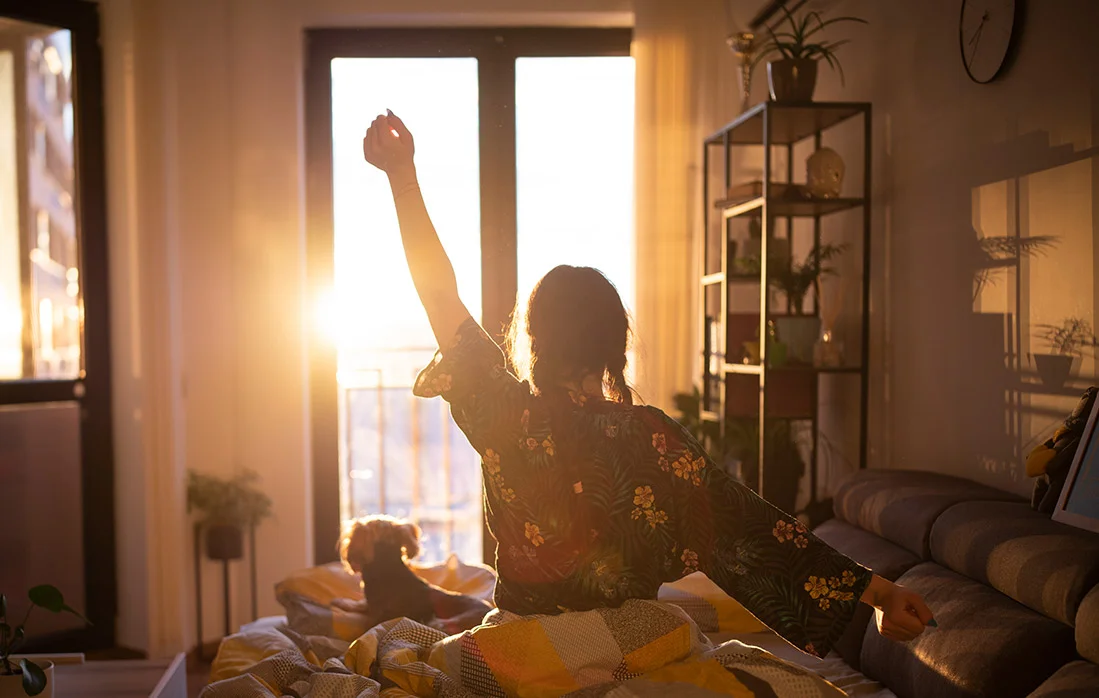
Walking is well established as an accessible and enjoyable form of movement that boosts your overall mental and physical health, reducing stress, increasing mindfulness, regulating blood sugar and pressure, and improving sleep quality. A recent Silent Walking trend popularized by TikTok creator Mady Maio takes the idea of mindful stress-relieving walks to a new level, eliminating distractions such as podcasts, music, or staring at your screen while navigating street signs (1).
Maio stated on social media that her nutritionist advised her to walk for 30 minutes daily as a healthful, stress-relieving alternative to intense cardio sessions, and her boyfriend helpfully suggested walking without distractions to increase the benefits.
Silent walking has since become a popular movement, with many claiming that it allows them to be alone with their thoughts and experience a sense of tranquility.
Walking without distractions is an increasingly rare get-back-to-the-roots activity in our fast-paced world. Mental health experts suggest that being present and free from distractions is beneficial for mental and emotional wellbeing and physical health. So, pairing the proven benefits of walking with a more mindful approach can likely be even more effective. Here’s what the experts have to say.
How Silent Walking Can Improve Sleep
According to a study published in the Advances in Preventative Medicine, regular physical activity such as walking has been shown to improve sleep quality and reduce the risk of sleep disorders (2). This is because, on a physiological level, our bodies are designed for movement and physical activity, according to Dr. Patrick Porter, neuroscience expert, Creator, and CEO of BrainTap. “Such activity is instrumental in promoting better sleep as it helps to exhaust the body and regulate our internal body clocks,” he says. Here are some further benefits of silent walking.
Reduces Stimulation
The silent walking trend also includes leaving out devices or other people to distract or fill a void while walking, turning your walks into a more intentional and mindful practice. One of the primary reasons this improves sleep is by providing a way to disconnect from the constant stimulation of technology. “This break from screens and notifications in the lead-up to bedtime can help improve sleep quality, as exposure to screens before sleep can disrupt circadian rhythms due to the blue light emitted, making it harder to fall asleep,” explains Dr. Ryan Sultan, MD, a researcher and teaching psychiatrist at Columbia University.
Increases Mindfulness with Walking Meditation
Silent walking often involves mindfulness or walking meditation techniques, which means focusing on the sensations of walking, breathing rhythm, and environment. “This mindfulness practice can calm the mind, reduce stress, and promote relaxation, all of which are conducive to better sleep,” says Dr. Sultan.
Dr. Porter encourages incorporating relaxation techniques into your routine, recommending practices such as deep breathing and being intentionally aware of your surroundings, which can significantly affect your sleep quality. “Relaxation exercises can help condition your mind for a better sleep experience,” he says.
In fact, research shows that meditation can regulate melatonin levels in the brain, which is a hormone responsible for letting your body know when to wind down for sleep (3). A Sleep Health study found that practicing meditation and exercise can improve sleep quality in adults with no sleep issues. Additionally, it was suggested that mindfulness meditation can enhance functioning even when feeling fatigued due to poor-quality sleep.
Reduction in Mental Chatter
According to Dr. Sultain, silent walking encourages individuals to let go of mental distractions and simply be present in the moment. “This can be particularly helpful for those who tend to overthink or ruminate before bedtime, as it allows them to clear their minds and create a mental space for restful sleep,” he says.
Research shows that mindful walking techniques boost mood, reduce brooding over bad feelings, and can improve mindfulness skills even further (4). So, the more you practice mindful silent walking, the better you’ll get at being present in the moment and letting go of mental chatter, anxious thoughts, and negative feelings.
Benefitting from Silent Walks
Silent walking can be beneficial for individuals of various ages and lifestyles. “It is particularly useful for those who struggle with sleep issues related to excessive screen time or mental restlessness,” says Dr. Sultan.
However, silent walks may not be the ideal choice for everyone. Some individuals may prefer other forms of relaxation or exercise to help with sleep, and those with mobility issues may find walking challenging.
Distractions Aren’t Always a Bad Thing
Depending on individual preferences and goals, there can be positive benefits to including distractions like podcasts or music on walks. Dr. Sultan points out that listening to educational podcasts or soothing music can enhance the overall walking experience for some people. And enjoying your exercise is the best way to keep yourself motivated and on track.
However, when aiming to improve sleep, it’s essential to select content that is calming rather than stimulating, according to Dr. Sultan. For example, soothing nature sounds or guided relaxation podcasts can be better than high-energy music or intense news programs.

10 Ways To Get More Natural Light During the Day

A Guide to Sleep and Heart Health

Leg Cramps At Night: Causes and Solutions

Are “Outside Clothes” Really Too Dirty to Wear in Bed?
Sources
1. @madymaio, TikTok; June 12, 2024: https://www.tiktok.com/@madymaio/video/7243831425072434474?q=SILENT%20WALKING&t=1695374514176
2. Brett A. Dolezal, Eric V. Neufeld, David M. Boland, Jennifer L. Martin, Christopher B. Cooper; “Interrelationship between Sleep and Exercise: A Systematic Review,” Advances in Preventive Medicine, Hindawi; https://www.hindawi.com/journals/apm/2017/1364387/; March 26, 2017.
3. Tooley GA, Armstrong SM, Norman TR, Sali A. Acute increases in night-time plasma melatonin levels following a period of meditation. Biol Psychol. 2000 May;53(1):69-78. doi: 10.1016/s0301-0511(00)00035-1. PMID: 10876066.
4. Gotink, R.A., Hermans, K.S., Geschwind, N. et al. Mindfulness and mood stimulate each other in an upward spiral: a mindful walking intervention using experience sampling. Mindfulness 7, 1114–1122 (2016). https://doi.org/10.1007/s12671-016-0550-8
Porter, Patrick. Author interview. October 2024.
Sultan, Ryan. Author interview. October 2024.


























